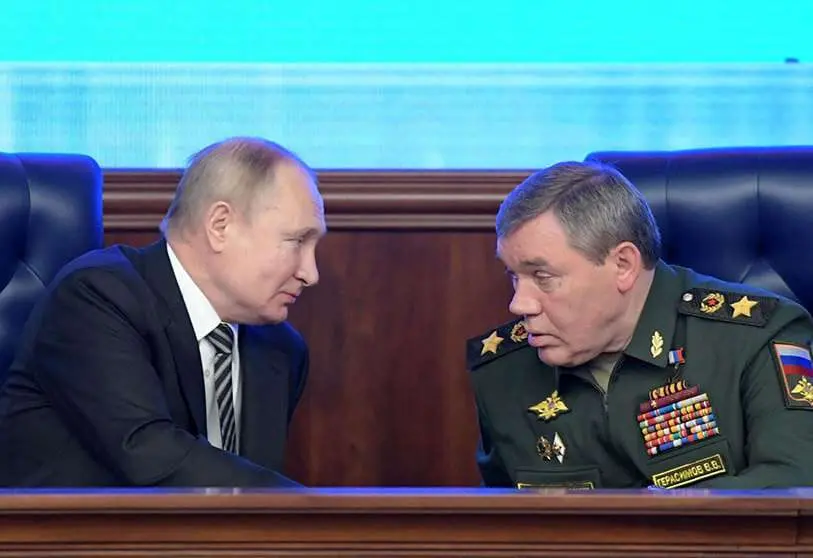Russia's top army commanders at war: a history of dismissals and appointments

Closer and closer to the first anniversary of its offensive in Ukraine, Moscow continues to search for a military strategy to put an end to what Russian political scientist and founder of R. Politik, Tatiana Stanovaya, has described since the end of July as a "progressive defeat". To this end, the head of the Kremlin's defence ministry, Sergey Shoigu, has announced the dismissal of Air Force Commander General Sergey Surovikin as commander-in-chief of Russian troops in Ukraine. The post will now be filled by the highest-ranking general in the country's armed forces, 67-year-old Chief of General Staff Valery Gerasimov.
"Gerasimov has been given command of the military operation because of the serious setbacks suffered by [his predecessor] Surovikin," Stanovaya told Reuters news agency. Now, "Putin is looking for effective tactics in this 'progressive' defeat [...], he is trying to rearrange the pieces".

According to the official statement issued by the Defence Ministry, this drastic change is expected to ensure "closer interaction between all branches of the Armed Forces, increase the quality of supplies and the efficiency of the leadership of different groups". However, analysts also point to an intention to strengthen the Russian army's position on the militias and paramilitary groups fighting on its side: the Chechens ('Kadirovtsis') led by Colonel General Ramzan Kadyrov, head of the Chechen Republic; and the fighters of Yevgeny Prigozhin's private military company Wagner Group.
Gerasimov, appointed chief of the General Staff and deputy defence ministry minister in 2012, is regarded as one of the country's most brilliant generals and has been recognised by the Russian president as a Hero of Russia. He played a key role in the 2014 Crimea war by designing major military operations, as well as in backing Al-Assad in the Syrian Civil War. In addition, the Ukrainian Military Prosecutor's Office has deemed him 'the main ideologue of the Donbas war', and - in the current war - the US ranks him alongside Putin as one of the senior Russian officials directly responsible for the conflict, which has earned him several Western sanctions.

However, fears over Gerasimov's appointment are not simply limited to his reputation as "the smartest of [Russia's] men" (in the words of Ukraine's own commander-in-chief of the Armed Forces, General Valery Zaluzhny, as quoted in Time), but also to his nuclear relevance. Valery Gerasimov is - along with Minister Sergey Shoigu and President Putin - one of the three Russian men who possess a "cheget", or nuclear briefcase. A mobile system that would allow the white - not red - button to be pressed and the Kremlin's nuclear arsenal to be mobilised in response to an attack on its interests.
"Gerasimov's appointment means that all the means of destruction in the arsenals of the Russian Armed Forces could be used," said Russian military hardliner Igor Korotchenko, who, according to Reuters, argues that part of Putin's decision is due to recent Western shipments of longer-range heavy weapons to Ukraine, and the prospect that "they will soon receive new armoured fighting vehicles".

The list of senior military appointments and dismissals since the beginning of the invasion of Ukraine is long, and has been marked by a rather erratic strategy since the start of Kiev's counteroffensive. Thus, August 2022 saw the replacement of the commander of the reputed Black Sea Fleet, Igor Osipov, by the new incoming commander, Viktor Sokolov. Osipov was dismissed after the sinking of the fleet's flagship and the loss of up to eight warplanes in attacks that led to nine days of explosions.
In late September, General Dmitry Bulgakov, deputy defence minister since 2008, became the next on President Putin's list of dismissals. Bulgakov was accused of poorly and hesitantly managing the Russian army's logistics in Ukraine, and was eventually replaced by Colonel General Mikhail Mizintsev, who was in charge of leading the brutal siege of the port city of Mariupol.

Just one month later, on 8 October, Air Force General Sergey Surovikin became commander-in-chief of Russian operations in Ukraine. This position had been held since April by General Alexander Dvornikov, 60, considered one of the country's most experienced military officers, and widely recognised by the Armed Forces after his role as leader of Russian troops in Syria in 2015.
And now, after less than four months as military leader in the Ukrainian conflict, Surovikin - also nicknamed "General Armageddon" - is being replaced by Gerasimov. Despite being credited with improving coordination between the various branches of the army and significantly strengthening control over Russian troops on Ukrainian territory, Surovikin has failed to fully satisfy Putin's military requirements, and will now take over as deputy to commander-in-chief Gerasimov, alongside General Oleg Salyukov (head of the Ground Forces), and Colonel General Alexei Kim (deputy chief of the General Staff).

In addition, just this week, Colonel General Alexander Lapin - dismissed as commander of Russia's Central Military District after the expulsion of Russian troops from Liman (a strategic and logistically key city in eastern Ukraine) - was appointed chief of the General Staff of the Ground Forces, despite harsh criticism from Chechen leader Kadyrov and oligarch Yevgeny Prigozhin.
Among the posts that now appear to be in jeopardy is that of the deputy prime minister in charge of aviation and other high-tech industries, Denis Manturov. During a television interview, the senior Russian official was given a stern warning by Putin who, after demanding that he should speed up the procurement of new aircraft, warned him: "You don't try to do everything you can. You do it, and within a month at the latest".








